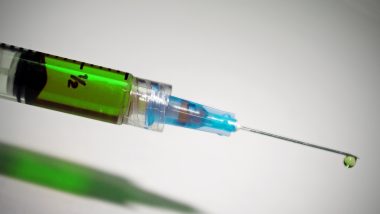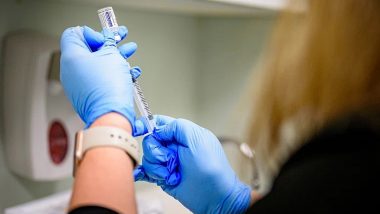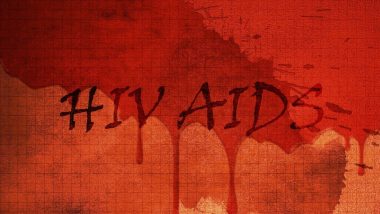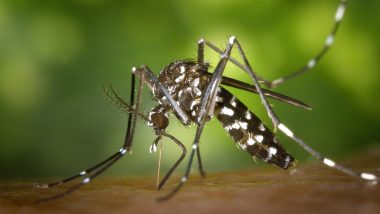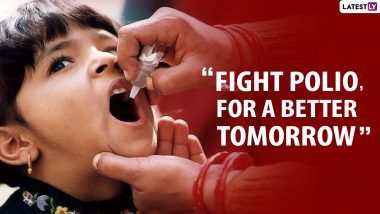New Delhi, June 13: A single-dose vaccine for chikungunya was found safe and produced a strong immune response against the viral disease, according to the first phase 3 trial of the preventive published in The Lancet journal.
However, the researchers were unable to investigate whether the VLA1553 vaccine, developed by French biotech company Valneva, protects against subsequent disease since the study was not conducted in regions where chikungunya is endemic. Climate Change Can Drive Global Outbreaks in Dengue, Zika and Chikungunya, Warns WHO.
Chikungunya is a mosquito-borne disease caused by the chikungunya virus (CHIKV), which is endemic in some regions of Africa, Asia, and the Americas. It causes a fever in patients roughly four to eight days after they have been bitten by an infected mosquito. Symptoms include headaches, fatigue, nausea, and severe muscle and joint pain.
The joint pain is often debilitating and usually lasts for a few days but may be prolonged, lasting for weeks, months or even years. Serious disease and death is rare, but older people and newborn babies are most at risk. Currently, there are no approved vaccines to prevent the disease caused by CHIKV infection nor are there effective antiviral treatments for the disease.
"This could be the first chikungunya vaccine available for people living in endemic regions, as well as for travellers to endemic areas or areas at risk for an upcoming outbreak," said study lead author, Martina Schneider, Clinical Strategy Manager at Valneva.
"Our promising results showed good persistence of antibody levels after vaccination, which is important considering that chikungunya outbreaks may recur suddenly. As age is a risk factor for severity and mortality of chikungunya disease, the strong immune response observed in older participants might be particularly beneficial," Schneider said in a statement.
Study author Katrin Dubischar, Program Director, Chikungunya Vaccine at Valneva noted that there is no dedicated treatment or vaccine available against chikungunya.
"Moreover, it is currently regarded as one of the viruses most likely to spread globally, and studies have shown that climate change is driving the spread of the mosquitos that carry it into new areas of the world. Therefore, having an effective vaccine is important for preparedness for future outbreaks," Dubischer said.
The study enrolled 4,115 healthy adults across 43 study sites in the US. 3,082 participants were given one dose of VLA1553 via an injection in the arm, and 1,033 were given a placebo.
All participants were included in the safety analysis but the immune response was only tested in a subgroup of 362 participants (266 given the vaccine and 96 given the placebo).
Participants had their immune responses assessed one week, 28 days, three months, and six months after their vaccination. They also recorded adverse events in an electronic diary for 11 days after vaccination.
After a single vaccination, VLA1553 induced antibody levels at a level that is considered to protect against disease among 99 per cent (263/266) of participants. There was no difference in immune response according to age, the researchers said.
VLA1553 was generally well tolerated across all age groups with most adverse events being mild or moderate. In those given the vaccine, the most common adverse events were headaches, fatigue, muscle pain, joint pain, and pain at the injection site. Chikungunya Symptoms: How to Know It is Dengue Fever or Any Other Mosquito-Borne Disease? Here are The Tell-Tale Signs of Chikungunya.
After six months, there were more adverse events recorded for those given VLA1553 than those given placebo. The safety profile in older adults was similar to that of adults. The authors note some limitations of their study. It did not take place in an endemic region, so participants' pre-existing immunity to the chikungunya virus is unknown, as is the safety of the vaccine in this population.
In addition, the vaccine is made from a weakened version of the live virus, so is likely to be unsuitable for people with weakened immune systems, and pregnant women.
They also acknowledge that to be highly effective in controlling endemic disease, a chikungunya vaccine will also need to be administered to children.
To determine safety and efficacy in this age group, there is a study in adolescents in endemic areas of Brazil currently ongoing.
Kathryn Stephenson, from Center for Virology and Vaccine Research at the Beth Israel Deaconess Medical Center, said, "…the positive results of this trial are very good news for CHIKV pandemic preparedness."
"CHIKV and other arboviral infections continue to be global threats, spurred on by the expansion of mosquito habitats because of climate change and globalisation of trade and travel," Stephenson, who was not involved in the study, said.
"Further studies of VLA1553 in endemic regions and expanded populations, such as an ongoing trial in adolescents in Brazil will be critical to affirming VLA1553's value for CHIKV prevention, as will be real-world effectiveness studies in the context of actual CHIKV outbreaks,” Stephenson added.
(This is an unedited and auto-generated story from Syndicated News feed, LatestLY Staff may not have modified or edited the content body)





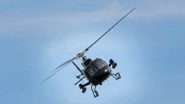







 Quickly
Quickly








